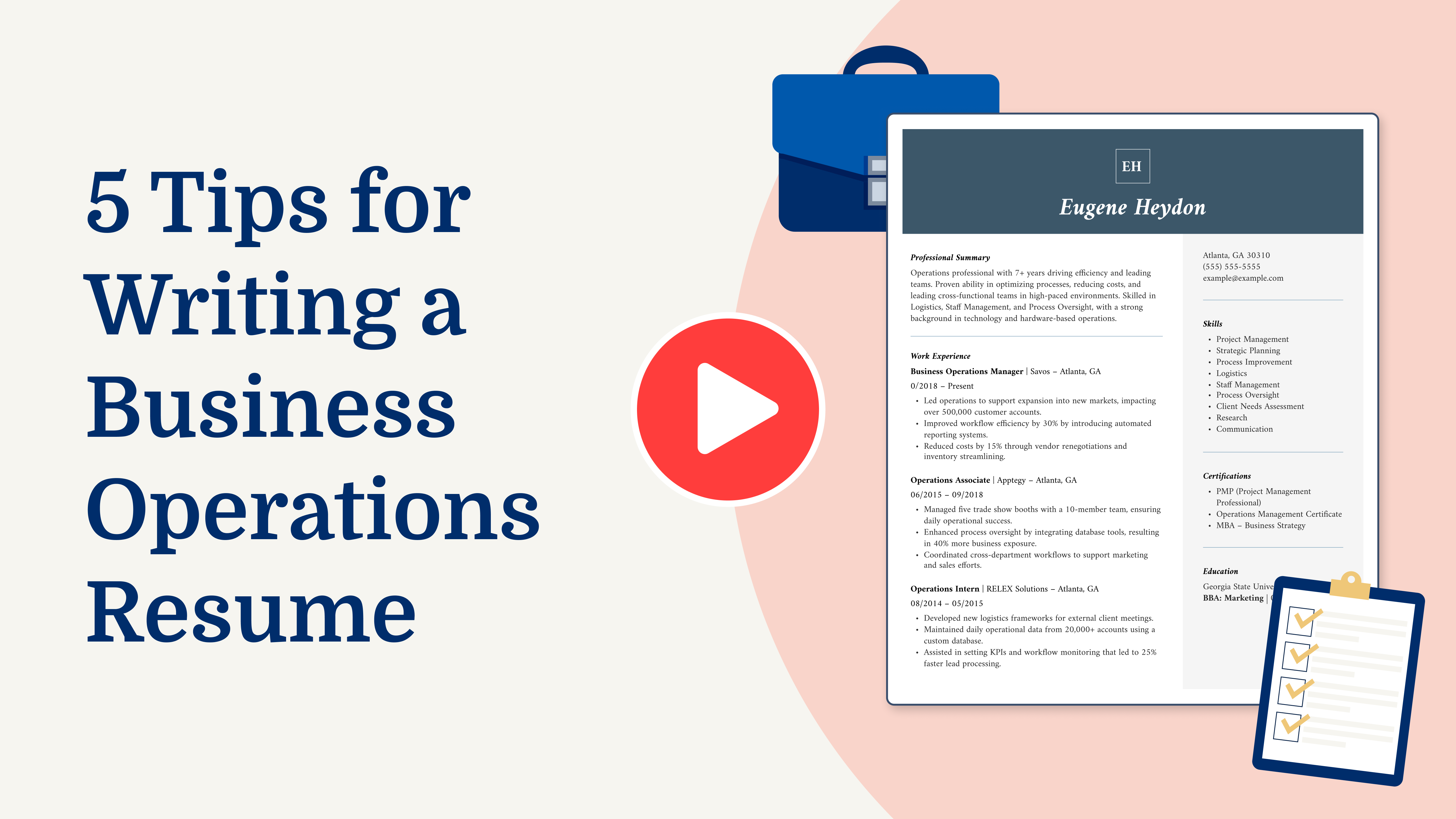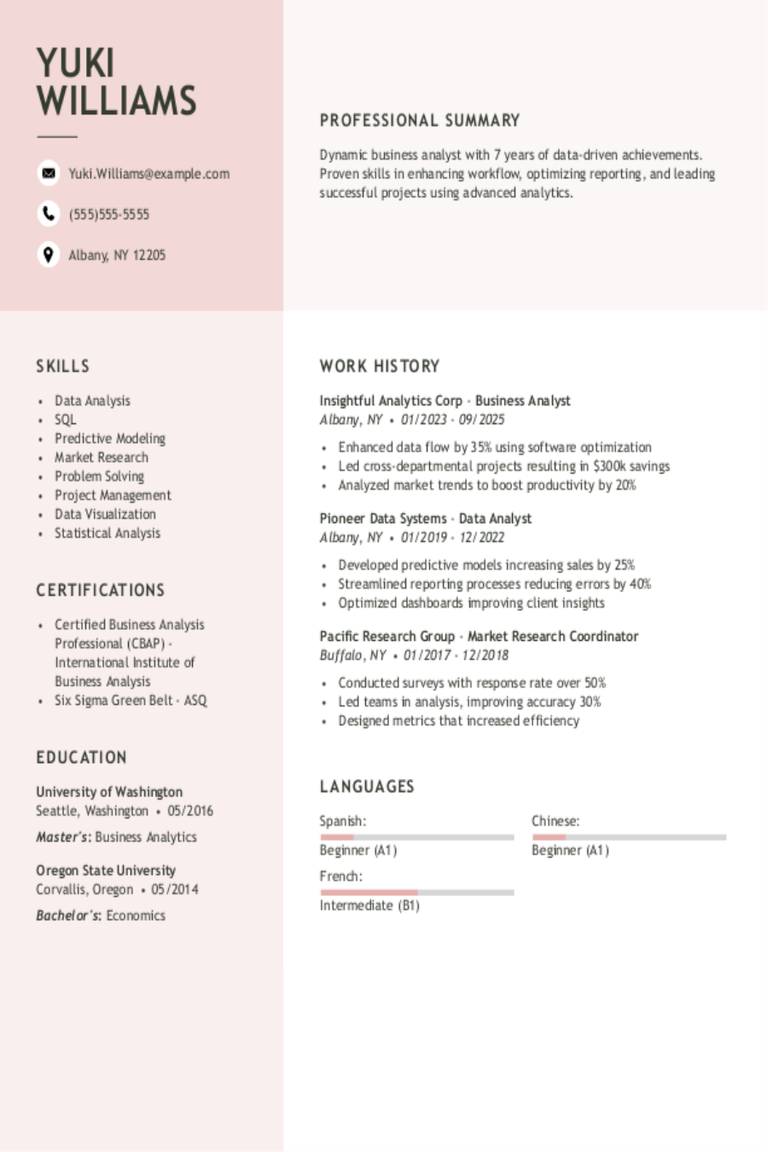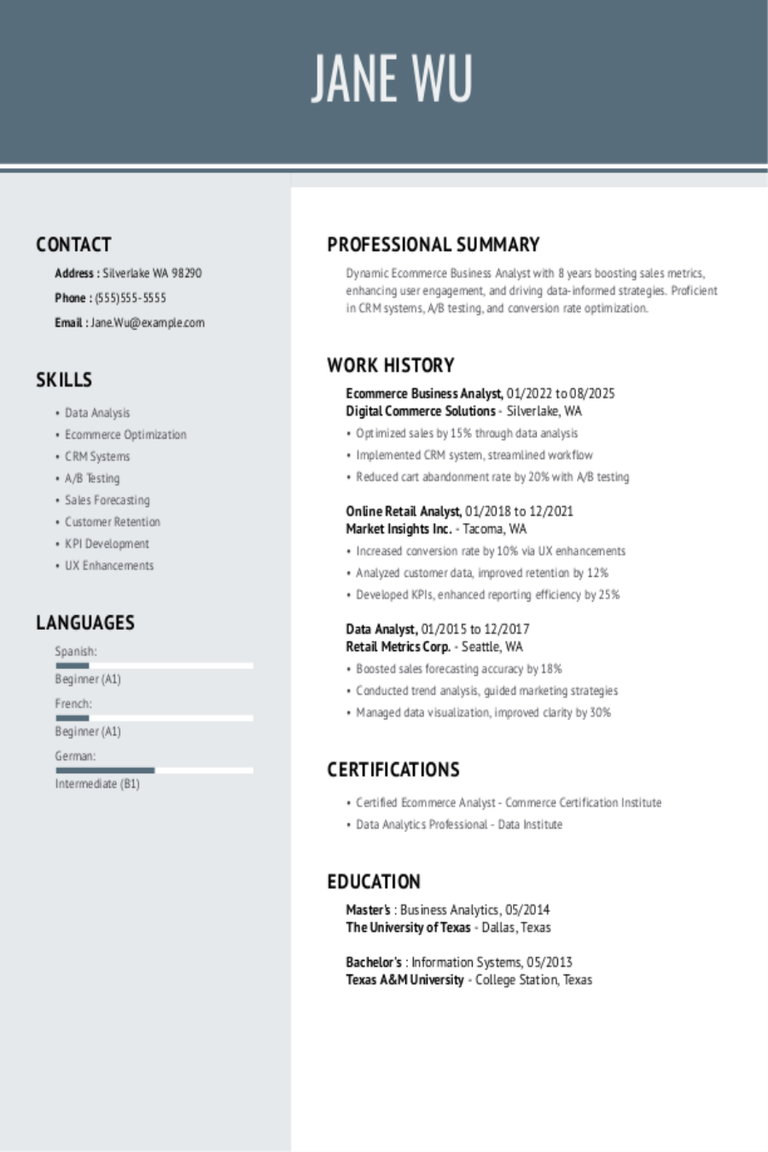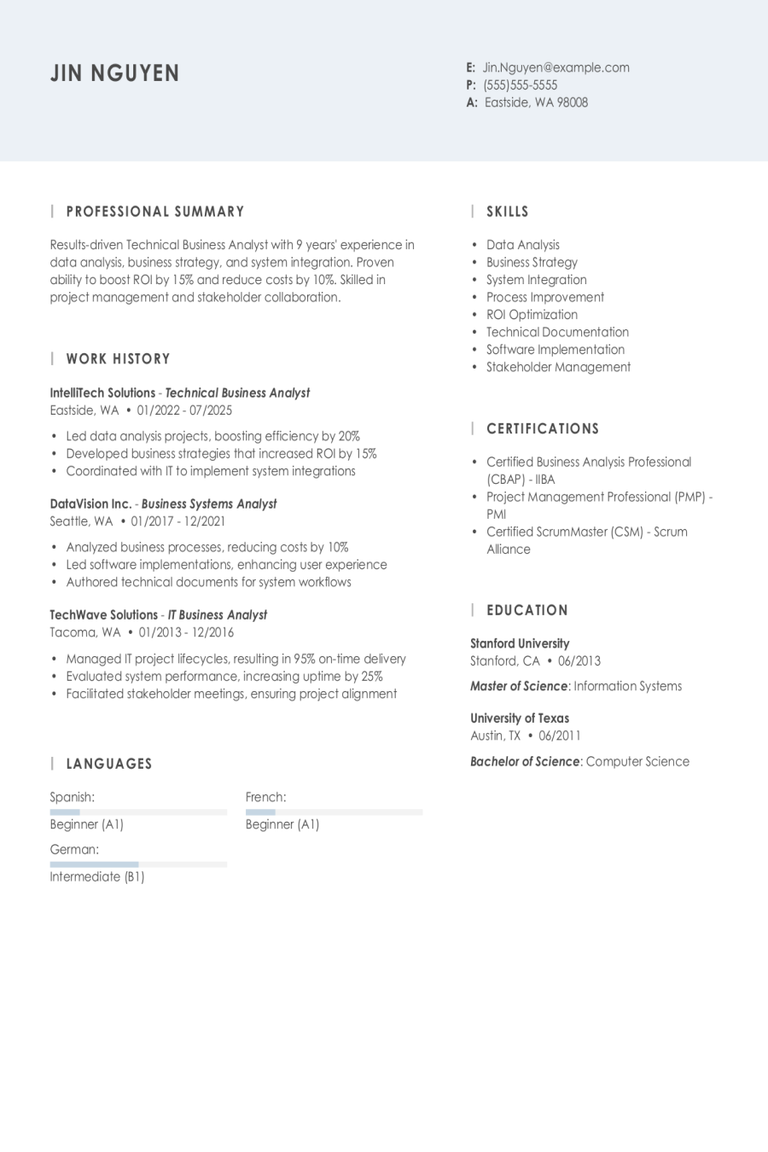Table of Contents
Get started with MyPerfectResume today!
- Build a resume on any device
- Pick an ATS-friendly template
- Tailor with AI copy suggestions
Why this resume works
- Quantifies accomplishments: Using metrics like a $50K cost reduction and 25% efficiency boost, the applicant’s achievements reflect strong contributions.
- Showcases career progression: Progressing from junior analyst to business intelligence analyst reveals growing responsibilities, showcasing adaptability and skill development across roles focused on data accuracy and decision-making improvements.
- Illustrates problem-solving ability: Developing dashboards that accelerated decision-making speed highlights innovative problem-solving skills while addressing organizational needs effectively.
More Business Intelligence Analyst Resume Examples
Check out our business intelligence analyst resume examples to understand how to showcase your data analysis skills, industry experience, and problem-solving abilities. These business operations resume samples will help you create a resume that attracts top employers in the field.
Entry-Level Business Intelligence Analyst
Why this resume works
- Centers on academic background: The applicant’s education section, showcasing a master’s in business analytics, paints a strong academic foundation for an early career stage.
- Puts skills at the forefront: With a skills-based resume format, key abilities like data visualization and SQL are prominently positioned to attract attention from employers.
- Shows digital literacy: Skill in tools such as Python and Tableau shows the applicant’s readiness for tech-driven roles, aligning well with computer skills needed today.
Mid-Level Business Intelligence Analyst
Why this resume works
- Points to measurable outcomes: By boosting ROI by 25% and increasing revenue by $2M, the applicant showcases a strong focus on achieving measurable outcomes in business intelligence roles.
- Displays technical expertise: The applicant’s extensive experience with SQL, Python, and KPI dashboards highlights their technical expertise essential for effective data analysis and business intelligence strategies.
- Demonstrates language abilities: Skill in Spanish, French, and German improves the applicant’s ability to engage in cross-cultural communication, supporting language skills needed for international projects.
Experienced Business Intelligence Analyst
Why this resume works
- Focuses on work history: Using a chronological resume, the applicant demonstrates extensive career experience, showcasing growth from junior to senior data analyst roles effectively.
- Showcases impressive accomplishments: The applicant’s accomplishments highlight significant achievements like reducing costs by 18%, reflecting compelling contributions and senior-level performance in business intelligence.
- Sections are well-organized: Strategically placed bullet points and headers ensure clarity, making sections easy to scan and improving the resume’s reader-friendly structure.
Business Intelligence Analyst Resume Template (Text Version)
Chris Huang
Indianapolis, IN 46203
(555)555-5555
Chris.Huang@example.com
Professional Summary
Experienced Business Intelligence Analyst with a proven track record of enhancing data accuracy and efficiency. Proficient in data analysis, BI tools, and dashboard development, contributing to significant cost savings and productivity boosts. Fluent in Spanish and holding certifications in SQL and business intelligence.
Skills
- Data Analysis
- Business Intelligence Tools
- SQL
- Data Visualization
- Dashboard Development
- Data Warehousing
- Predictive Analytics
- Report Generation
Certifications
- Certified Business Intelligence Professional – TDWI
- SQL Querying Certification – Oracle
Education
Master of Science Business Analytics
Stanford University Stanford, California
June 2017
Bachelor of Science Statistics
University of California Berkeley, California
May 2015
Work History
Business Intelligence Analyst
Data Insights Group – Indianapolis, IN
May 2022 – August 2025
- Analyzed data reporting for a 25% efficiency increase.
- Developed BI tools that reduced costs by $50K annually.
- Implemented dashboards, enhancing decision-making speed.
Data Analyst
Tech Solutions Inc. – Indianapolis, IN
May 2018 – May 2022
- Transformed raw data, improving accuracy by 30%.
- Conducted market analysis saving $100K.
- Collaborated with teams, boosting productivity by 15%.
Junior Data Analyst
Innovative Data Corps – Indianapolis, IN
May 2017 – May 2018
- Supported data management, increasing efficiency by 20%.
- Extracted data insights that reduced errors by 10%.
- Assisted in creating reports, enhancing clarity by 25%.
Languages
- Spanish – Beginner (A1)
- French – Beginner (A1)
- Mandarin – Beginner (A1)
Related Resume Guides
Advice for Writing Your Business Intelligence Analyst Resume
Explore our tips on how to write a resume specifically for business intelligence analysts, and discover how to highlight your analytical skills, experience with data tools, and ability to turn numbers into actionable insights.

Highlight relevant technical skills
Being a business intelligence analyst means having strong technical skills is really important. You can either make a special section just for these skills or add them to your work experience. Highlighting what you know in this area makes you great at understanding data and helping businesses decide what to do next.
For this role, you’ll want to mention skills like SQL for managing databases and Python or R for analyzing data, as well as Excel for handling spreadsheets. Knowing how to use tools like Tableau or Power BI is also helpful since they create visual reports that are easy to understand. Being familiar with data warehousing concepts and ETL processes can be key in handling large datasets effectively.
When listing technical skills, focus on those relevant to the job you’re applying for. Highlighting your ability to work with big data technologies such as Hadoop or Spark can set you apart if the position requires it. By clearly showing these abilities on your resume, you demonstrate that you’re ready to tackle complex problems and provide valuable insights as a business intelligence analyst.
Example of a technical skills section
- Data visualization (Tableau, Power BI)
- SQL & database management
- ETL processes (Talend, Informatica)
- Python for data analysis
- Statistical analysis & modeling
- R programming
- Big data technologies (Hadoop, Spark)
- Cloud platforms (AWS, Azure)
- Business intelligence tools (QlikView, MicroStrategy)
Soft skills matter a lot! Teamwork, communication, and adaptability are just as important as technical skills in many jobs. Use our Resume Builder to ensure your resume shows a balanced skill set.
Quantify your accomplishments
Quantifying accomplishments on a resume makes it stand out by showing what you have achieved, not just what you did. For a business intelligence analyst, it’s important to turn job duties into achievements with numbers that show your impact. This helps hiring managers see your value quickly.
Instead of saying “analyzed data,” you might say “increased sales by 15% through data analysis.” This way, each job entry in the work experience section should include the job title, employer name, location, and employment dates, along with these measurable results.
Using action verbs and metrics makes your resume more interesting and focused on results. For example, instead of “responsible for reports,” say “developed reports that cut decision-making time by 30%.” These kinds of statements show how effective you are at solving problems and making improvements.
Quantified accomplishments help prove your skills and make it easier for hiring managers to see why you’re a great fit for the role. They can quickly understand how you’ve made an impact in previous jobs and how you might contribute to their company as a business intelligence analyst.
5 business intelligence analyst work history bullet points
- Developed and maintained over 50 interactive dashboards, improving decision-making for cross-functional teams and increasing data accessibility by 40%.
- Analyzed large datasets to identify business trends, resulting in a 25% increase in sales through targeted marketing strategies.
- Collaborated with IT and management to streamline data processes, reducing report generation time by 30% and improving operational efficiency.
- Implemented automated data validation procedures, decreasing errors in reporting by 15% and ensuring high-quality insights delivery.
- Led the migration of legacy data systems to a cloud-based platform, improving data retrieval speed by 50% and reducing costs.
Need help getting started on your resume? Check out our professional resume examples to find ideas that make your skills and experience stand out.
Write a powerful professional summary
A professional summary on a resume acts as an introduction that grabs the attention of hiring managers, giving them a quick glimpse of who you are and what makes you stand out.
The professional summary is a short paragraph highlighting your experience, skills, and achievements. It’s ideal for those with solid work history as it shows your professional identity and value to employers. For someone applying for a business intelligence analyst role, this section should focus on past projects where data-driven insights led to successful outcomes.
Conversely, resume objectives state your career goals and are better suited for entry-level job seekers, career changers, or those with employment gaps. While summaries focus on “what I’ve accomplished,” objectives highlight “what I aim to contribute.”
Next, we’ll provide examples of both summaries and objectives tailored for different industries and levels of experience.
Business intelligence analyst resume summary examples
Entry-level
Recent graduate with a Bachelor of Science in data analytics and a certification in Microsoft Power BI. Equipped with foundational skills in data visualization, SQL, and statistical analysis. Experienced in conducting academic projects that involved creating dashboards and generating insights to support decision-making processes. Eager to apply analytical skills to contribute to business intelligence initiatives.
Mid-career
Business intelligence analyst with six years of experience in the retail industry, adept at transforming complex datasets into actionable insights. Proven track record of developing interactive dashboards using Tableau and performing detailed market analysis to drive strategic planning. Recognized for improving sales forecasting accuracy by 20% through innovative data modeling techniques.
Experienced
Seasoned business intelligence analyst specializing in financial services with over 12 years of expertise in leading cross-functional teams to deliver data-driven strategies. Expert in advanced SQL queries, predictive analytics, and machine learning applications. Successfully managed multiple high-impact projects resulting in a 30% increase in operational efficiency and cost reduction across departments.
Business intelligence analyst resume objective examples
Recent graduate
Analytical and detail-oriented recent graduate with a Bachelor of Science in data analytics seeking an entry-level business intelligence analyst position. Eager to apply strong skills in data visualization and statistical analysis to support decision-making processes and contribute to a team-focused environment.
Career changer
Results-driven professional transitioning from marketing into business intelligence analysis, bringing experience in market research and data interpretation. Committed to leveraging analytical skills and industry knowledge to uncover insights that drive strategic growth in a forward-thinking company.
Entry-level applicant
Aspiring business intelligence analyst with hands-on experience using tools such as Power BI and Tableau through internship projects. Looking to join a dynamic organization where problem-solving abilities can be used to improve data-driven strategies and improve operational efficiencies.
Using a resume template with simple fonts ensures clarity. Organize sections well and minimize flashy graphics to highlight your job history and skills effectively.
Showcase your credentials
Listing your credentials is important for a business intelligence analyst because it shows your skills and knowledge in the field. Certifications, licenses, and specialized training can set you apart from others by showing you’re committed to learning. They prove that you understand key tools and software used in business intelligence.
By creating a certifications section on your resume, you make it easy for employers to see what extra skills you bring to the table.
- AWS Certified Solutions Architect
- Google Professional Cloud Engineer
- Microsoft Certified: Azure Solutions Architect Expert
- Certified Kubernetes Administrator (CKA)
- CompTIA Security+
Having these certifications can boost your chances of landing a job as a business intelligence analyst. They show that you’re ready to tackle complex data problems with the right tools. This makes you a strong applicant for employers looking for skilled analysts.
Example of a certifications section
Microsoft Certified: Data Analyst Associate
Issued by: Microsoft
Issued 2023
Tableau Desktop Specialist
Issued by: Tableau
Expires 2025
IBM Certified Business Intelligence Analyst
Issued by: IBM
Issued 2021
Certified Analytics Professional (CAP)
Issued by: INFORMS
Expires 2026
SAS Certified BI Content Developer
Issued by: SAS Institute
Issued 2022
Use our ATS Resume Checker to spot over 30 common errors and ensure your formatting is ready to pass applicant tracking systems (ATS).
FAQ
Do I need to include a cover letter with my business intelligence analyst resume?
Yes, including a cover letter with your business intelligence analyst resume can make a significant difference.
A cover letter allows you to highlight your specific interest in the company and role, emphasizing your analytical skills and experience with data-driven decision making.
For instance, if the company uses particular BI tools or has a focus on certain industries, you can elaborate on your expertise in those areas.
Consider using a Cover Letter Generator to streamline the process of creating a tailored and professional cover letter that complements your resume.
Additionally, reviewing cover letter examples specific to business intelligence roles can provide valuable insights and inspiration for crafting your own compelling narrative.
How long should a business intelligence analyst’s resume be?
For a business intelligence analyst, an one-page resume is effective if you’re early in your career or making a transition, focusing on core skills like data analysis and tool skill.
However, if you possess extensive experience or hold advanced certifications, a two-page resume can better capture your expertise by including relevant projects and achievements that demonstrate your impact on business decisions.
Ultimately, how long a resume should be depends on the depth of your experience and relevance to the role.
How do you write a business intelligence analyst resume with no experience?
Crafting a resume with no experience for a business intelligence analyst role means highlighting your education, relevant skills, and any projects or internships related to data analysis. Follow these tips:
- Highlight education: Start with your degree in a related field like Computer Science, Mathematics, or Business. Include coursework in data analysis, statistics, and database management that aligns with the role.
- Showcase technical skills: List BI tools you are familiar with such as SQL, Excel, Tableau, or Power BI. If you’ve completed online courses or certifications in these areas, be sure to include them.
- Include project work: Detail any academic or personal projects where you’ve analyzed data sets or created dashboards. Describe the tools used and the insights you derived from these projects.
- Focus on analytical abilities: Highlight any experience involving problem-solving or decision-making based on data. This could come from volunteer work or part-time jobs where analytical thinking was key.
Rate this article
Business Intelligence Analyst
Share this page
Additional Resources

Business Analyst Resume Examples & Templates
Explore business analyst resume examples to see how to showcase your problem-solving, teamwork, and data skills. Browse tips to highlight your experience turning ideas into action and improving processes to

E-Commerce Business Analyst Resume Examples & Templates
Discover e-commerce business analyst resume samples that emphasize analyzing market trends and improving online sales. These examples and tips will help you highlight your data analysis skills and relevant experience

Technical Business Analyst Resume Examples & Templates
Use these technical business analyst resumes to learn how to show your method for solving problems, analyze data, and improve business processes. These examples will help you understand how to

Business Analyst Resume Examples & Templates
Explore business analyst resume examples to see how to highlight your problem-solving skills and experience improving processes and driving business success.Build my resumeImport existing resumeCustomize this templateWhy this resume worksQuantifies
Business Owner Cover Letter Examples & Templates for 2026
Discover business owner cover letter examples to understand how to start your cover letter, emphasize your most relevant experiences, and finish on a strong note that leaves a lasting impression
Business Operations Cover Letter Examples & Templates for 2026
Explore business operations cover letter examples to see how to start your cover letter, emphasize essential skills, and finish with a strong closing statement that stands out to recruiters.Build my
